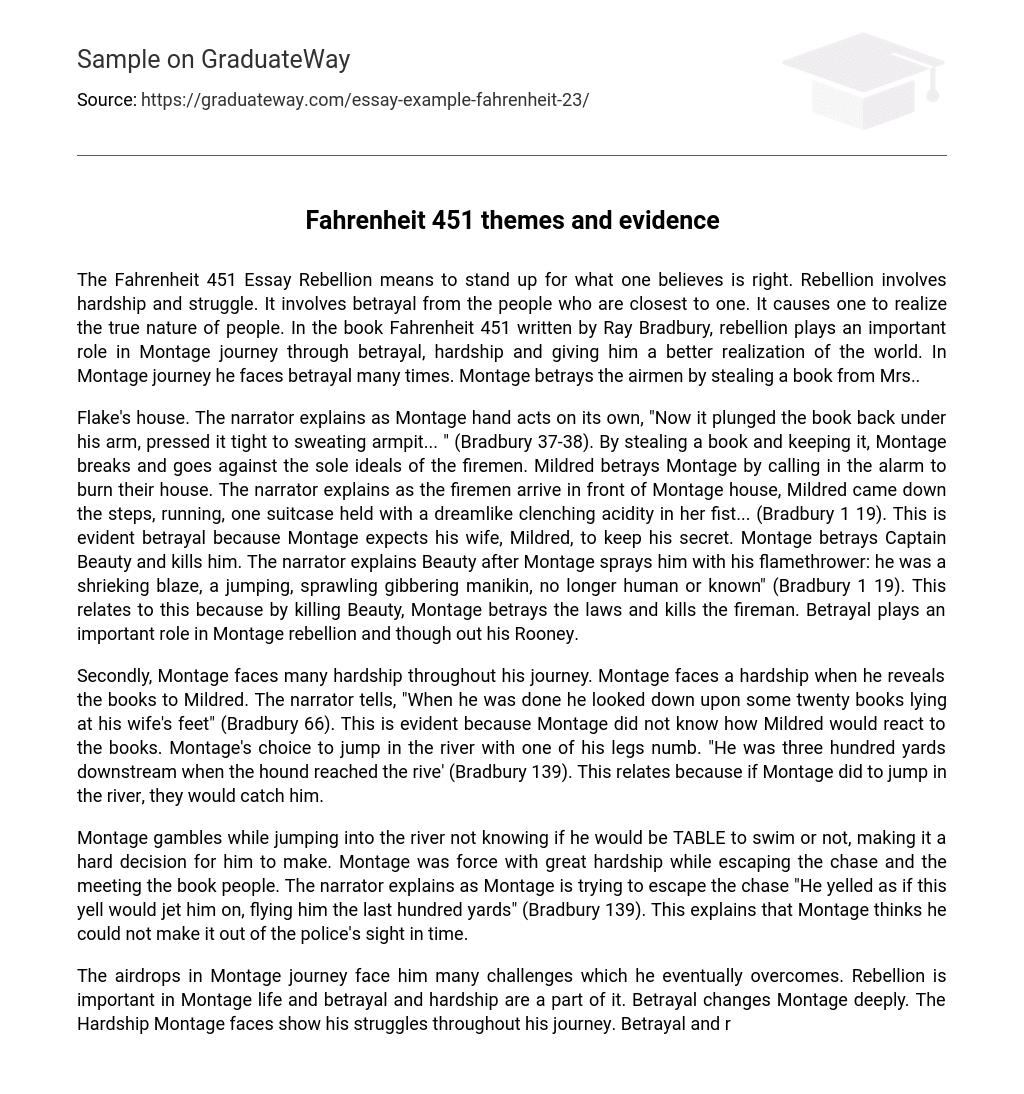The concept of rebellion in Fahrenheit 451 involves standing up for one’s beliefs, facing hardship and struggle, experiencing betrayal from loved ones, and gaining a deeper understanding of human nature. In Ray Bradbury’s book, Montage undergoes a journey that revolves around betrayal, hardship, and a greater realization of the world. Throughout his journey, Montage encounters multiple instances of betrayal, including stealing a book from Mrs. the airmen.
Flake’s house is where the betrayal and rebellion take place. The narrator describes how Montage’s hand acts independently to hide the stolen book, saying “Now it plunged the book back under his arm, pressed it tight to sweating armpit…” (Bradbury 37-38). This act goes against the firemen’s principles, as Montage steals and keeps a book. In turn, Mildred betrays Montage by alerting the firemen to burn their house. As they arrive at Montage’s house, the narrator depicts Mildred running down the steps with a suitcase tightly clenched in her fist, full of an acidic dreamlike intent…” (Bradbury 119). This betrays Montage’s trust as he thought his wife would keep his secret. Montage also betrays Captain Beauty by killing him. The narrator describes Beauty after Montage sprays him with his flamethrower: “he was a shrieking blaze, a jumping, sprawling gibbering manikin, no longer human or known” (Bradbury 119). This act not only goes against the laws but also murders a fireman. Betrayal plays a significant role in Montage’s rebellion and is prevalent throughout the story.
Moreover, throughout his journey, Montage faces various hardships. One instance is when he discloses the books to Mildred. The narrator describes the scene, stating, “When he was done he looked down upon some twenty books lying at his wife’s feet” (Bradbury 66). This exemplifies Montage’s uncertainty about Mildred’s reaction to the books. Additionally, Montage encounters a challenge when he decides to leap into the river despite having one of his legs numb. The narrator states, “He was three hundred yards downstream when the hound reached the river” (Bradbury 139). This incident is significant because had Montage not jumped into the river, he would have been captured by the hound.
Montage takes a risk by jumping into the river, uncertain of his swimming abilities, making the decision a difficult one for him. He faces immense difficulties while trying to escape from the pursuit and encountering the book people. The narrator describes Montage’s desperate attempt to evade capture, “He yelled as if this yell would propel him forward, carrying him the remaining distance” (Bradbury 139). This indicates that Montage believes he may not be able to escape the police in time.
The airdrops in Montage’s journey present numerous challenges that he ultimately conquers. Rebellion holds great significance in Montage’s life as it brings about betrayal and adversity. Betrayal profoundly alters Montage’s character. The hardships Montage encounters depict the challenges he endures on his journey. Both betrayal and rebellion have a profound psychological impact on individuals, causing them to undergo transformation. One cannot remain unchanged in such circumstances.





